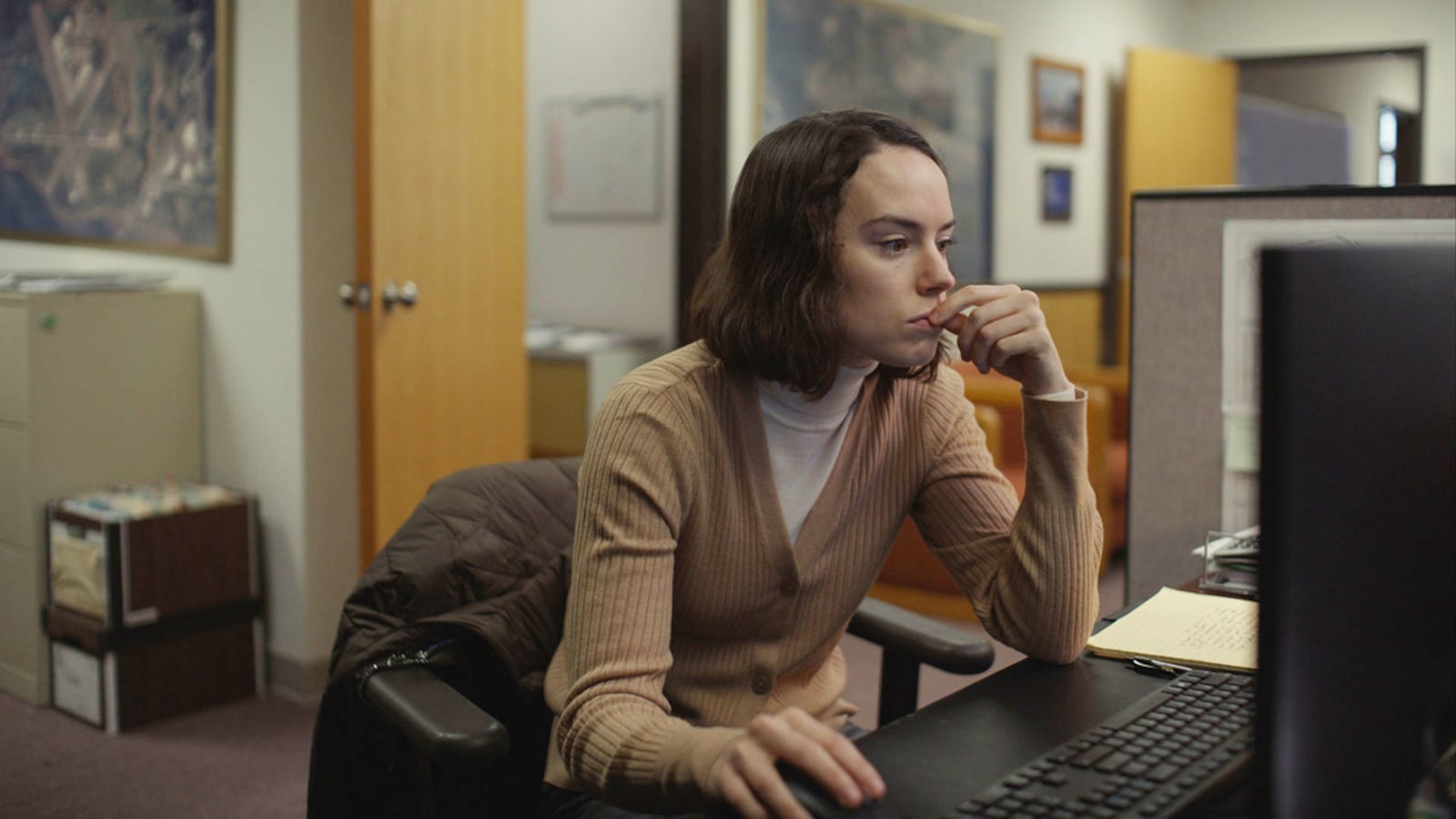There’s a moment early on in Sometimes I Think About Dying, the buzzy dark comedy that premiered at this year’s Sundance Film Festival, that might be the most succinct depiction of depression ever put to screen.
After returning home from her humdrum office job, quiet accountant Fran (a sublime Daisy Ridley) slathers a boatload of cottage cheese onto some microwaveable, Salisbury steak-looking slab of protein. That’s what we would call a “depression meal,” as in the random amalgamation of stuff in your kitchen that you throw together and eat standing up. Contemplation of your body, laying lifeless in a serene forest is optional—but often, the two are a package deal.
Sundance is the first opportunity in a new year that stars have to come out swinging. In the span of only a few short days, actors have the chance to impress jurors, critics, and audiences so considerably that their names might stay on everyone’s lips for the next year.
Already, we’ve seen a handful of big, bold turns at Sundance this year—Mia Goth in her most sinister work yet; Anne Hathaway in full thriller-mode; Jonathan Majors by way of DeNiro in a role that will garner his first Oscar nomination. But it’s Ridley’s quiet, calm performance I haven’t been able to stop thinking about. Her name may be buried among the the bevy of headlines that have been rolling out of this year’s festival, but that’s alright too. Her performance isn’t just one of an underdog; it’s one that will change the world’s perception of her entirely.
Sometimes I Think About Dying understands that our most unintentionally grim intrusive thoughts often happen at random. We’ve all waited for the light to change at a crosswalk, wondering what would happen if we stepped out too early. Or, we’ve looked over a ledge and tried to conjure the sensation that the brief moment falling through the air would produce. It’s grim, of course, but it’s distinctly human. Our dissociative state begs us to contemplate the worst, even if we don’t necessarily want it to happen.
The same is true for Fran. She doesn’t want to die, she just thinks about it sometimes. Every now and again, she’ll look out the window that sits near her desk and think about being lifted up by the crane that works outside. Or, she’ll imagine a snake slowly slithering up behind her to do the deed without her knowing. There’s not an idea of intent, but rather, something to ponder outside the feeling of everyday mundanity.
Despite the gloomy nature of its premise, Sometimes I Think About Dying is surprisingly life-affirming. When Fran’s office life is shaken up by the arrival of a new colleague, the film documents the journey out of her comfort zone with thoughtful care. But it’s Daisy Ridley’s sweet, soft performance that brings this film about contemplating death its splendid vitality.

When viewers first meet Fran, she’s heading into her office on the rainy Oregon coast, clad in a modest and practical down coat. Fran settles into her cubicle, excited to get lost in something she understands: spreadsheets. Fran likes puzzles and numbers; she’s stimulated more by frolicking in her own brain than she is in conversation. But just because she’s insular doesn’t mean that she isn’t observant. Fran’s favorite office hobby is using her diffident nature to eavesdrop on her coworker’s conversations.
When her new coworker, Robert (David Merheje), begins at work, he quickly takes notice of Fran and manages to strike up a wryly humorous Slack conversation. Suddenly, we understand: it’s not that she doesn’t want to talk to her coworkers, it’s just that she can’t quite figure out how.
Ridley, a warm and charismatic actress who helped bring life into the third chapter of the expansive Star Wars franchise, unexpectedly slips right into Fran’s detachment. Her physicality is understood from the film’s first frames. Fran’s shoulders are slumped at her desk while she works, hand at her face to self-soothe; her head remains down when she moves from the office kitchen back to her chair; she turns with only her head, not with her whole body. Ridley has the mannerisms of someone who doesn’t want to be seen down pat, and wears them as close to her chin as Fran’s simple turtlenecks.
Ridley’s movements are so well-realized that when Fran is asked out to a movie by Robert, even the slightest difference in body language is remarkably noticeable. It’s also painfully relatable. Like any of us, Fran—sometimes unwittingly—longs to be seen. She grew up in a quiet home, in an even quieter town. Her interests don’t mesh with those of her coworkers, who are the only people Fran interacts with on a regular basis. And while she’s content with the sparse life she’s fallen into, she doesn’t run from the possibility of sharing it with someone else. Ridley’s eyes light with a glow, her shoulders fall just a fraction, and Fran agrees to go out.
As the film progresses, Fran continues to surprise herself. She all but gulps out the order for an Irish coffee to go along with her and Robert’s shared slice of pie after the movie. She spends time at her desk wondering if Robert will return her Slack message, or if she offended him too badly when she told him that she didn’t like the film. Robert, who is caring and gracious, assures her that she’s done nothing wrong. The spark of a connection isn’t always founded on mutual interests, but rather the inclination to see the beauty that the other person sees in the things they love most. Robert wants to know those things about Fran, but the cloud of her depression makes it difficult for him to peer in.
Sometimes I Think About Dying is not a sob story, and its actors never allow their characters to become melodramatic and archetypal. The film makes no sweeping untruths; Robert does not and cannot “fix” Fran, nor vice versa. They see each other as two parts of a greater whole, just a couple of specks in a massive universe that will never bring them answers, only an inevitable ending. The most vivid beauty of Sometimes I Think About Dying is watching Fran and Robert figure out if they want to spend some of their time together before that point comes.
Taking a quiet indie movie like this to marvelous heights is no small challenge, but Ridley’s charming Fran is so completely understood that, by the time the credits roll, Sometimes I Think About Dying sits right next to your heart. Ridley has never been so wonderful, and the film is a testament to her talents outside of the splashy franchise that made her a household name. Star Wars fans fell in love with her character, Rey, because of Ridley’s unique ability to exhibit stunning vulnerability as a resolute hero. In her first lead role since that chapter closed, she does the same on a much smaller, realistic scale.
Ridley saves Fran from becoming a one-dimensional caricature, too sparse to feel as human as she should. She doesn’t challenge us to come out of our shells, but rather offers an understanding nod in the viewer’s direction. In Ridley’s capable hands, Fran becomes a mirror. That powerful and potent feeling Fran desires—the one that can only come from being seen by someone else—is offered back to us. Ridley’s ability to steer our expectations for her performance in an entirely new direction is a rare gift, one that not every actor is capable of.
Audiences will walk away from most films at Sundance seeing a character. With Ridley in front of the camera, they come away seeing themselves.






